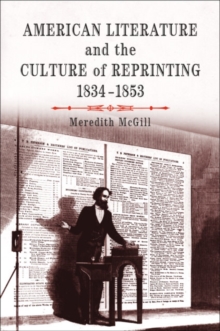
The Prosthetic Tongue : Printing Technology and the Rise of the French Language Hardback
by Katie Chenoweth
Part of the Material Texts series
Hardback
Description
Of all the cultural "revolutions" brought about by the development of printing technology during the sixteenth century, perhaps the most remarkable but least understood is the purported rise of European vernacular languages.
It is generally accepted that the invention of printing constitutes an event in the history of language that has profoundly shaped modernity, and yet the exact nature of this transformation-the mechanics of the event-has remained curiously unexamined. In The Prosthetic Tongue, Katie Chenoweth explores the relationship between printing and the vernacular as it took shape in sixteenth-century France and charts the technological reinvention of French across a range of domains, from typography, orthography, and grammar to politics, pedagogy, and poetics.
Under Francois I, the king known in his own time as the "Father of Letters," both printing and vernacular language emerged as major cultural and political forces.
Beginning in 1529, French underwent a remarkable transformation, as printers and writers began to reimagine their mother tongue as mechanically reproducible.
The first accent marks appeared in French texts, the first French grammar books and dictionaries were published, phonetic spelling reforms were debated, modern Roman typefaces replaced gothic scripts, and French was codified as a legal idiom. This was, Chenoweth argues, a veritable "new media" moment, in which the print medium served as the underlying material apparatus and conceptual framework for a revolutionary reinvention of the vernacular.
Rather than tell the story of the origin of the modern French language, however, she seeks to destabilize this very notion of "origin" by situating the cultural formation of French in a scene of media technology and reproducibility.
No less than the paper book issuing from sixteenth-century printing presses, the modern French language is a product of the age of mechanical reproduction.
Information
-
Available to Order - This title is available to order, with delivery expected within 2 weeks
- Format:Hardback
- Pages:360 pages, 27 illus.
- Publisher:University of Pennsylvania Press
- Publication Date:01/11/2019
- Category:
- ISBN:9780812251494
Information
-
Available to Order - This title is available to order, with delivery expected within 2 weeks
- Format:Hardback
- Pages:360 pages, 27 illus.
- Publisher:University of Pennsylvania Press
- Publication Date:01/11/2019
- Category:
- ISBN:9780812251494










